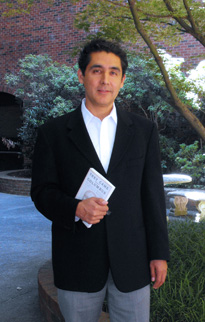Dr. Omar H. Ali
Associate Professor of African American & African Diaspora Studies, 2012
Professor, 2016

They Came Before Columbus: The African Presence in Ancient America
by Ivan Van Sertima
First published in 1976, They Came Before Columbus: The African Presence in Ancient America by Ivan van Sertima, challenged me to rethink all of world history. Like other academic books, it has its empirical and methodological limitations, however, it also provides a wonderful counter-narrative to the still dominant Eurocentric view of the making of the world. Reading and discussing it with my good friend Cecilia Salvatierra back in the mid-1990s, helped me learn about the subjectivity and political nature of History, as a discipline, and indeed all knowledge. The book is not simply a work of Afrocentrism (providing yet another essentialist view of world history). Rather, it is a thoughtful examination of global contacts that grows out of decades of work among scholars from a range of fields. Its thesis, based on a host of archival, ethnographic, linguistic, and archeological evidence (more or less circumstantial, as is the case of all evidence), is illuminating: Africans made contact with the Americas before Columbus (and several times, including as late as the 14th century). To what extent such contacts shaped Native American cultures is debatable, but the fact that such contacts may have been made points to the malleability of history. History, as it turns out, may be changed. That is, our understanding of history changes over time--just as we understand particular events in our own lives differently as we get older. I want to thank Cecilia for introducing me to this book and supporting me over the years to continue wrestling, delving, and now teaching about the past through the limited tools of the present. The take away: exploring history is a creative process; we should remain open--indeed embrace--the many ways of understanding the world. This lifelong and social process of discovery continues to fascinate me, which this book reminds me of whenever it happens to come to mind. I hope you have a chance to read it and start (or continue) your own philosophical conversations with friends, family, colleagues, students, classmates, teachers ... whoever, whenever!